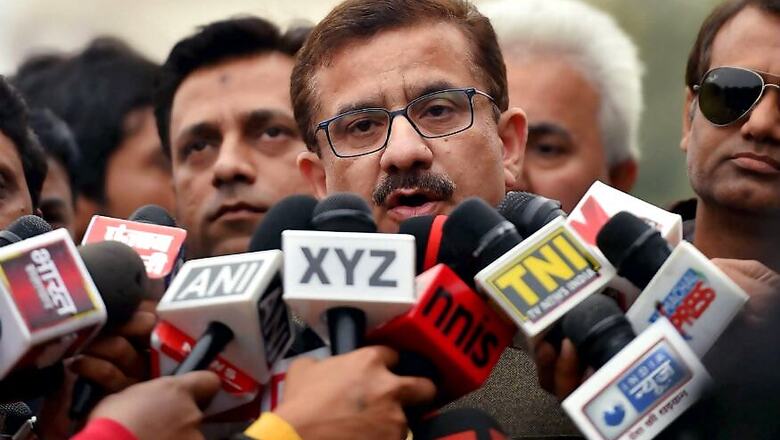
views
Lucknow: Chairman of UP Shia Waqf Board Waseem Rizvi has been “excommunicated” for not heeding to a fatwa issued by Iraq’s top Shia cleric Ayatollah Ali Al-Sistani against handing over Waqf properties for the construction of a temple or shrine, a top Shia cleric said on Friday.
Rizvi’s “ouster” from the Shia community, following the controversy over his offer of disputed land at Babri Masjid site for Ram Temple construction, was announced by senior Shia cleric Maulana Kalbe Jawad in Lucknow during Friday prayers.
Speaking to News18, Maulana Jawwad said Shias all around the world were “embarrassed” by Rizvi. “Shias all around the world are facing embarrassment because of the statements made by Waseem Rizvi. People like Rizvi are working against Islam either under pressure or just to please their masters. On my recent visit to Iran, people were asking me questions and I am answerable to them on the kind of things he is doing.”
Maulana Jawad also said that since Waseem Rizvi is “not a Shia anymore”, he must be removed from the post of Shia Waqf Board Chairman.
“After a fatwa from Ayatollah Ali Al Sistani, there is no chance of rejecting it. Anyone who opposes his fatwa has no right to be called a Shia anymore. Hence, I have asked the government to remove him from the post. We have already said that whatever the court decides will be acceptable to us, but Waseem Rizvi seems to be in a hurry. How can he donate land when he is not the owner? He is just the caretaker. He is fooling the entire nation by saying that he is donating the land. He can donate his own house if he wants, but he cannot donate land which does not belong to him,” Maulana Jawad added.
Rejecting the ‘excommunication, Rizvi said, “Maulana Jawad is a witness in the Babri Masjid demolition case, which is why he is trying to put pressure on the Shia Waqf Board. Nobody has the right to cast anyone out of Islam, no matter how big the cleric is."
Rizvi’s decision to offer disputed land at Babri Masjid site for the construction of Ram Temple in Ayodhya had led Kanpur-based educationist Dr Mazhar Naqvi to pose a query on its legality. Sistatni’s fatwa was in response to this query. Rizvi has repeatedly argued that the Babri Masjid was constructed by a Shia ruler, and hence, the Waqf property belongs to the community, free to be offered for the Ram Temple.
While rejecting the fatwa, Rizvi had said that the UP Shia Waq Board will follow the Indian Constitution and not the fatwa. “There is an international pressure on Shia Waqf Board to support the Babri Masjid litigants. This fatwa from Ayatollah Sistani is a part of that tactic. Shia Waqf Board will work as per the norms laid down by the Indian Constitution and not as per any pressure from terrorists or according to any fatwa. We are not ready to abide by the cleric's opinion. The advice was taken after misguiding him on the issue,” he had said.
“Ram Temple in Ayodhya is a question of faith for Hindus and Shia Waqf Board is concerned about development of the society and the country. Hindus should get their right and Muslims should refrain from taking away anyone’s right. Shia Waqf Board will maintain its stand even if all the Muslims of the world stand in our opposition,” Rizvi had said.
The Uttar Pradesh Shia Waqf Board had urged the Supreme Court to act as a mediator in the Ayodhya case and has suggested that a Ram Temple be built at the disputed site and a mosque in a nearby Muslim-dominated area as a way out of the bitter court battle over the land.
The UP Shia Waqf Board had cited historical references to Mir Baqi, the person who built the Babri mosque, as being a Shia Muslim and hence the mutawali (caretaker) of the mosque was also the Shia Waqf Board.














Comments
0 comment